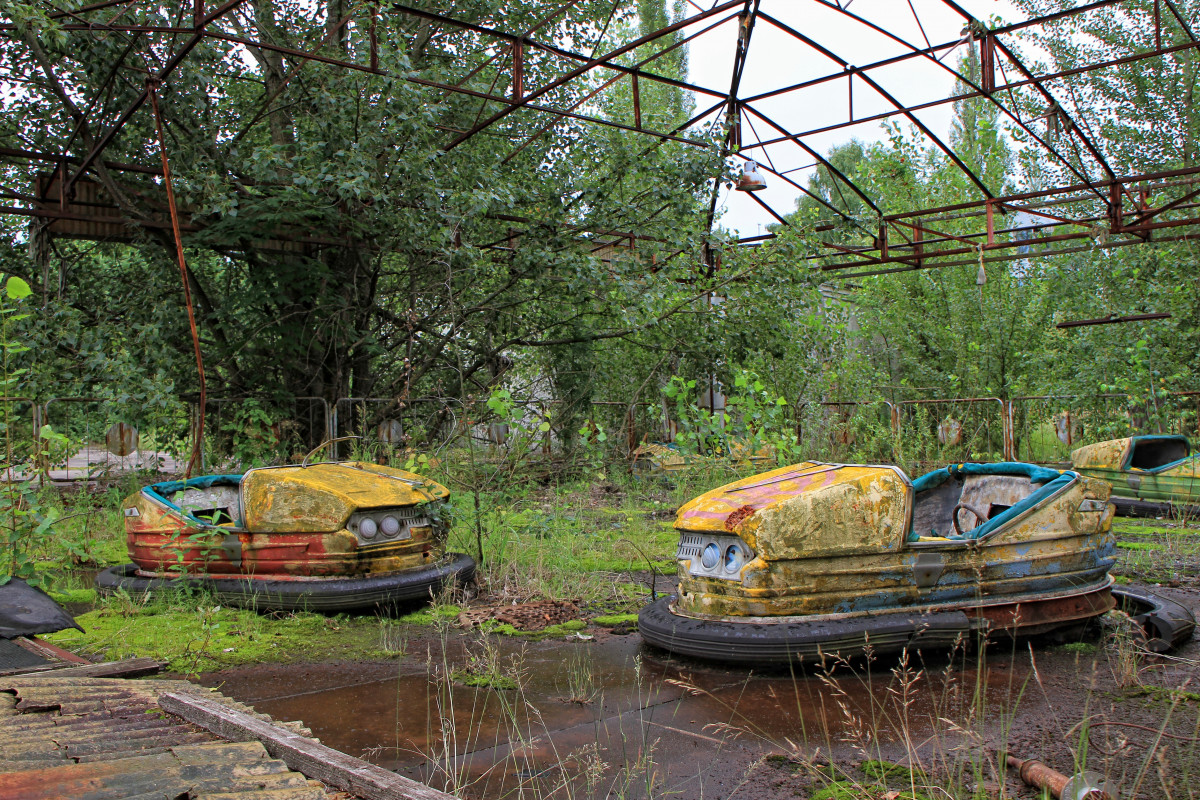 |
| Signs of Soviet decline, amusement park near Chernobyl disaster (occurred 1986). Photo via PXhere [CC0] |
 Nowhere Man by Aleksandar Hemon
Nowhere Man by Aleksandar HemonMy rating: 3 of 5 stars
I discovered this novel at a bookshop where I also purchased two other novels written (respectively) by Chinese-American and Cambodian-American women. After reading several international authors, in addition to the classics, I have recently purchased books by authors either translated into English or written by authors with English as a second language.
This is one of the most recently-written novels I have read, published in 2002. What I find remarkable is that Hemon arrived in the United States in 1991, and began writing in English in 1995, echoing Nabokov (one of my favourite authors).
The plot encompasses the experiences of Jozef Pronek, a Bosnian stranded in the United States by the war in the former Yugoslavia. (A refugee but not really a refugee.) The character comes from "Blind Jozef Pronek & Dead Souls" in Hemon's first work, a short story collection entitled The Question of Bruno (which I haven't read).
Different narrators take up the story of Pronek as he moves between an English course, working as a private investigator and a Greenpeace canvasser, with flashbacks between his experiences in Sarajevo and the Ukraine. The different narrators are an interesting device, providing different perspectives of Pronek.
At times, however, I found this a little confusing, assuming the first narrator was the protagonist who would reappear sometime later in the story. Instead, a seemingly unrelated story of Captain Pick in Shanghai some 100 years earlier echoes the events of Pronek's experiences, culminating in a wonderfully layered finale.
The subtitle of the novel, The Pronek Fantasies (which I didn't notice until after I had finished the novel), makes a little more sense of the unusual intertwining of plot devices.
Before I wrote this, I checked reviews of this book from The Guardian and the New York Times.
Maya Jaggi (The Guardian) points out the obvious economy of words and the interesting use of the English language. Gary Shteyngart (NYT) points to Pronek's broken English and Hemon's constant references to how everything smells. This I found most interesting. Ernest Hemingway (Death in the Afternoon, 1939, p. 225) was a master in describing the sensual experience. For example:
If qualities have odors the odor of courage to me is the smell of smoked leather or the smell of a frozen road or the smell of the sea when the wind rips the top from a wave...
But Hemon captures the feel of the Soviet Union towards the end, with the train "much too salty" (p. 85), references to the smell of sweat and armpits, and the endless "socialist grease" (p. 94) on everything.
But my favourite quote captures the imagination and (I imagine) what it was like immediately before the Soviet Union collapsed (p. 85):
I thought that if another revolution were ever to break out in the USSR, it would start on a train or some other public transportation vehicle - the spark would come from two sweaty asses rubbing.
It is true that you can actually smell this novel (more so than any I have read before) and for that alone it is clever. But on finishing the work, I had to sit and wonder.
Both Jaggi and Shteyngart point to some of the novels shortcomings, and I have other reservations. But I was glued to the chair as I read the work, and elements of the iceberg theory are evident in that as I write I am still asking questions of the characters and the historical story.
I can imagine the experience of being an immigrant, even though my mono-lingual self would struggle much more than Pronek ever did.
So what did I get from this work? First, being competent in a language does not a story-teller make. Hemon proves this and I am envious.
Second, there is something in such works that one cannot get from a classic novel written in a person's first language and culture. This is clear to me, and it is why I am broadening my reading horizons to capture much of the new work that is appearing from authors with immigrant backgrounds and also from international authors only recently being translated into English.
For poor, mono-cultural me, this is the closest I can get without having to go through the experience myself.
I think, too, that reading Hemon's first work would be useful, and I will endeavour to buy a copy of Bruno in the near future to test this theory.
Otherwise, I enjoyed my break from St Theresa and her "vain modesty" trope, but I may need a little more before I can get back to the good saint's crystal castle. Hopefully with less of the olfactory saltiness of Prenok's past to haunt my nostrils.
 Donate
Donate




